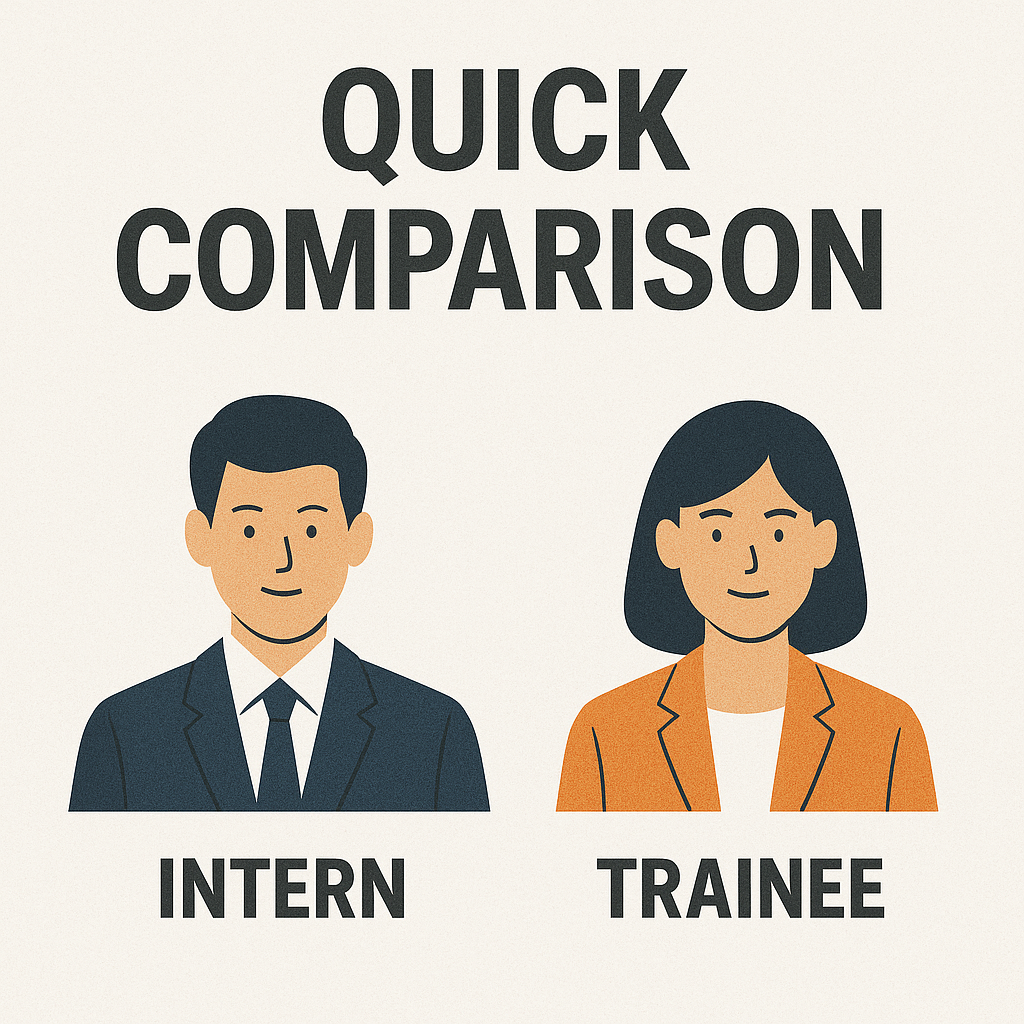At Summa Global Education (US Trainee), we are a designated sponsor for the J-1 Trainee Program. Many people who first hear about J-1 visas confuse the Intern program with the Trainee program. While the two share some similarities, they serve very different purposes, with distinct requirements and benefits.
Because our mission is to support professionals through the Trainee program, we want to help you clearly understand the differences — and why the Trainee track is the right fit for those with professional experience seeking career development in the U.S.
Quick Comparison
| Category | Intern | Trainee |
|---|---|---|
| Eligibility | Enrolled at a university abroad, or graduated within the past 12 months | Degree + 1 year of related work experience, OR 5 years of related work experience without a degree |
| Maximum Length | Up to 12 months | Up to 18 months (Hospitality & Agriculture limited to 12 months) |
| Repeat Participation | Possible if the applicant is still a student or recent graduate | Possible after 2 years outside the U.S., provided the program is higher-level or in a different field |
| Focus | First professional experience | Advanced, structured training and career development |
| Best For | Students, new graduates | Young professionals and experienced employees |
1. Eligibility
-
Intern: Open only to students enrolled in a post-secondary institution abroad, or those who graduated within 12 months of the program start date.
-
Trainee: Open to professionals who hold a degree or certificate from abroad plus one year of related work experience, or those with at least five years of related work experience (no degree required).
English proficiency is required for both tracks and must be verified through a test, transcript, or interview.
2. Program Duration
-
Intern: Maximum of 12 months.
-
Trainee: Maximum of 18 months (with the exception of Hospitality & Tourism and Agriculture, which are limited to 12 months).
All programs must be full-time (32+ hours per week) and based on a structured DS-7002 Training/Internship Placement Plan.
3. Repeat Participation
-
Intern: May repeat the program if still eligible as a student or recent graduate.
-
Trainee: May repeat only after at least two years outside the U.S., and the next program must represent higher-level skills or be in a different occupational field.
This makes the Trainee track a unique opportunity for one-time, in-depth training.
4. Common Program Requirements
Both programs require:
-
A DS-7002 Training/Internship Placement Plan, signed by all parties before DS-2019 issuance.
-
A structured, full-time program of at least 32 hours per week.
-
Proper supervision, mentoring, and evaluation by the host company.
-
Sponsor-provided orientation, monitoring, and ongoing support throughout the program.
5. Restrictions
Certain roles are prohibited under both Intern and Trainee programs:
-
Unskilled or clerical work beyond 20% of the program.
-
Childcare, elder care, or patient care (including clinical and medical treatment).
-
Staffing/placement agency roles where participants are outsourced rather than directly trained.
-
In Hospitality programs over 6 months, training must rotate through at least three departments.
6. Eligible Occupational Categories
J-1 Trainee programs are available in a wide range of fields, including:
-
Agriculture, Forestry, and Fishing
-
Arts and Culture
-
Construction
-
Education, Social Sciences, Counseling, and Social Services
-
Health (non-clinical)
-
Hospitality and Tourism
-
Information Media and Communications
-
Management, Business, Commerce, and Finance
-
Public Administration and Law
-
Sciences, Engineering, Architecture, Mathematics, and Industrial Occupations
7. Why the Trainee Program Matters
While the Intern track is designed for students and new graduates, the Trainee program is tailored for professionals who want to advance their careers. It is the right fit if you want to:
-
Build advanced, career-ready skills in your professional field.
-
Gain practical experience in U.S. business practices and workplace culture.
-
Strengthen your global career opportunities and leadership potential.
-
Create long-term professional connections across borders.
Frequently Asked Questions
Is there an age limit?
No specific age limit exists. The key factor is whether you meet the education and work experience requirements.
Can J-1 Trainee programs be paid?
Yes, they may be paid or unpaid. However, the purpose of the program is training and cultural exchange — not regular employment. Any compensation must comply with U.S. labor laws and be clearly stated in the DS-7002 plan.
Next Steps
If you’re interested in becoming a host company, please register at https://j1.ustrainee.org/register.
Once registered, we will match you with qualified international talent that fits your needs and guide you through the simple approval process.
Feel free to contact us!
Office: +1 (215) 361-8588
📧 Email: ustrainee@anbeducation.com
🌐 Organization: Summa Global Education (US Trainee)

